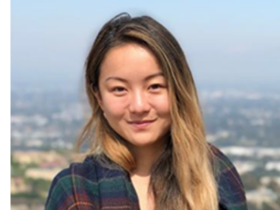Career Profile
Ting Lin:
Helping Patients Through Medical Labeling
To get a new drug onto the market is a large task and requires collaboration from so many different functional areas. I alone do not have the knowledge in all these fields. So, I work with experts in these fields, borrowing their brainpower and expertise, to write up the best labels possible for our drugs.
Time management, project management, people management, scientific literacy, medical writing, strategic thinking, strategic planning—these are all skills Ting Lin draws on for her role as a global labeling strategist at Amgen in Thousand Oaks, California.
We spoke with Lin about the field of drug labeling, her path to the career, and her views on the future of the field.
What do you do at Amgen? Does your daily routine tend to be predictable?
I work on labeling strategies for some of Amgen’s innovative drug products. A drug’s label contains all the latest scientific understandings about a drug’s efficacy and safety. It is important that I keep these labels concise, accurate, and competitive so that patients and physicians can understand how to best use the drugs. As a result, if there is any new data that arise for a drug from clinical trials or post-marketing reporting, my priorities for the day can suddenly shuffle to accommodate the high importance of evaluating and incorporating the new data into the label.
What drove you to this career path?
I wanted to become a pharmacist to understand how the body interacts with medicines and how to treat diseases better. After I completed my Doctor of Pharmacy, I joined the pharmaceutical industry to work on the front-end of research and development (R&D) for new drugs. By doing so, I wanted to have a bigger impact on the betterment of healthcare by getting new drugs onto the market—from a regulatory standpoint. To qualify to do that, I completed a 2-year postdoctoral fellowship in regulatory affairs and landed in the sub-specialty of regulatory affairs that is regulatory labeling.
What early educational experiences were most useful in preparing you for this job?
All the science and math classes helped me get into pharmacy school, which paved the foundation for a career in medicinal R&D. So, definitely don’t skip out on them in school.
Can you please describe something that surprised you in your work?
Though I am the regulatory labeling expert on my product team, I’m happily surprised to find the depth of knowledge many of my non-labeling team members have on drug labeling. It is an area where experience counts. I can rely on my more-experienced team members to help when I run into challenges. To get a new drug onto the market is a large task and requires collaboration from so many different functional areas. I alone do not have the knowledge in all these fields. So, I work with experts in these fields, borrowing their brainpower and expertise, to write up the best labels possible for our drugs.
What do you anticipate in the future for this field?
Regulatory affairs is a growing field. As more new-age biotechnology companies are founded, and innovative therapies researched and developed, companies will see a growing need for capable regulatory affairs professionals to help get their therapies to market. It is extremely rewarding for regulatory professionals to see their own contribution come into fruition when a new drug is approved by the health agency, the FDA for example, and becomes a valuable treatment option for patients in need.
What advice do you have for students interested in this area?
I would encourage students to pursue the sciences and stay informed on science discoveries and policies. Read up on new drugs that come to market—see how they differ from other existing treatment options. I guarantee that the more you stay informed on science advancement, the more you would want to get involved!
